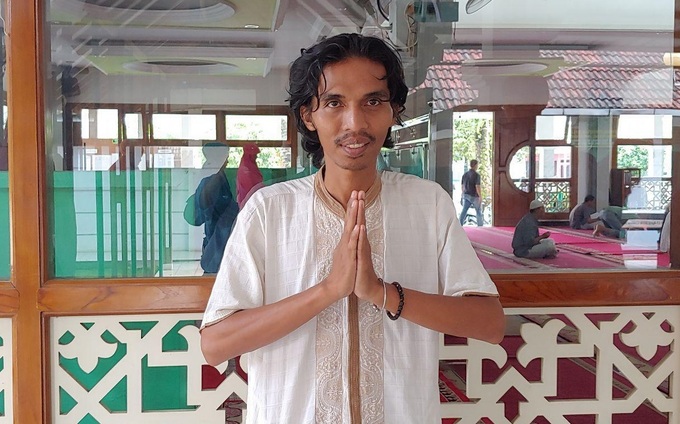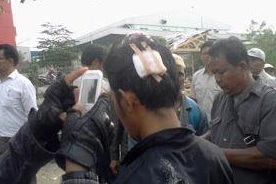 |
|
Zulherman during his interview with the Hankyoreh on May 17 in Bekasi, Indonesia. (Ock Kee-won, staff reporter)
|
Union at factory in Cikarang, Indonesia, destroyed just 40 days after its formation
 |
|
Zulherman during his interview with the Hankyoreh on May 17 in Bekasi, Indonesia. (Ock Kee-won, staff reporter)
|
‘Union-free workplace’ is the keyword that links Samsung’s factories around the world together. Since late Samsung founder Lee Byung-chul proclaimed that unions would be allowed “over my dead body,” this principle has remained in place across three generations. However, this anachronistic management policy is out of touch with global standards and continues to lead to discord with the present Samsung that has already grown into a global enterprise. This reality can be seen through the case of Indonesia, the first Samsung overseas factory to set up a legal labor union.
Zulherman, 39, a former engineer at the Samsung Electronics factory in Cikarang, Indonesia, still vividly remembers October 21, 2012. That was the day that the first legal labor union at an overseas Samsung Electronics production facility came into existence. “I submitted the certificate of union registration to the company myself,” Zulherman said. The manager’s face immediately took on a displeased look, and it seemed that he was very surprised.” But even at that point, Zulherman could never have predicted the tribulations that lay ahead for him and his colleagues.
Samsung responded with threats, persuasion, surveillance, and violence, the same as it has done in Korea. Union members were subject to surveillance within the factory and had their movements outside the factory tracked. The union, which had been formed for the purpose of creating a factory that did not discriminate against irregular workers, did not last long. Shaken by the continued threats from Samsung, union members began to leave the company one after the other. It took only 40 days for Samsung to completely destroy the union.
Zulherman, the former leader of the Samsung Electronics union that belonged to the Federation of Indonesia Metal Workers Union (FSPMI), turned down several interview requests from the Hankyoreh. Although he gave only the evasive answer “I don’t wish to speak about unpleasant memories with the Korean media,” it wasn’t until near the end of the interview that the real reason for his refusal came to light. After numerous complications, the interview was finally arranged thanks to persistent persuasion from local civic groups and the FSPMI. This is the first interview Zulherman has granted to a foreign media outlet. The destruction of the union at Samsung’s Cikarang factory has previously only received a brief mention in reports by international labor organizations. After being buried for a long time, we finally heard the full story about the destruction of the union when we met with Zulherman in a mosque near FSPMI’s Bekasi branch office.
 |
|
Zulherman, former chairman of the labor union at a Samsung Electronics factory in Cikarang, Indonesia, talks to the Hankyoreh at the office of the Federation of Indonesia Metal Workers Union (FSPMI) in the city of Bekasi on May 13. (Kim Do-seong, Hankyoreh TV producer)
|
Discrimination against contract and outsourced workers
Zulherman joined the company in 1999 and worked as a production line engineer. He was employed as a regular worker and core staff member. His role involved analyzing the behavior of production line workers to come up with strategies to boost production efficiency. Zulherman started working at Samsung because he wanted to earn money for his family. His first impression upon joining Samsung was “a top global company that offered a safe work environment and high salary,” and “a job for life that I wanted to work at for a long time.”
As time passed, this illusion gradually broke down. As Zulherman began to awaken to the reality in which he and his colleagues were overworked like slaves, he became what Samsung refers to as an ‘MJ’ (munje sawon, literally “problem employee,” someone who has the potential to try to form a union.) The outsourced colleagues Zulherman worked with often found themselves suddenly fired overnight, and did not receive extra pay even if they worked overtime to meet unfulfilled production targets. “Many of my close friends at work were outsourced workers,” Zulherman said. “As I talked with them, I thought that we needed to unionize. They performed the same work as regular workers, but were discriminated against in terms of pay and meal benefits. They were routinely fired on the spot even if they worked hard.”
 |
|
Zulherman recounts how Samsung systematically destroyed the union he’d helped formed in 2012. (Kim Do-seong, Hankyoreh TV producer)
|
A company-controlled union called “Harmony”
At the time, contract workers and outsourced workers accounted for nearly 800 of the Cikarang factory’s 2,800 employees. The factory produced home appliances for domestic consumption in Indonesia, the world’s fourth largest country in terms of population, and was effectively operating through the blood, sweat and tears of irregular workers. However, Samsung provided differential wages and treatment to workers on the same production line based on their classification as regular, contracted, or outsourced workers. This was a flexible labor strategy designed to leverage production manpower during the peak production season between July and December. When workers protested about the discrimination to managers, they received a curt reply that it was “none of their business.” Zulherman’s belief that a union was necessary grew stronger. Under Indonesian labor law, it was illegal to have outsourced employees work alongside regular employees on production lines.
The formation of the union was conducted in secret. Zulherman went to see FSPMI, explaining the situation in the Samsung factory and stating his intention to set up a union. At the time, the organization was vocal about the issue of irregular workers, and had helped workers to unionize in other nearby businesses. After two months, 10 regular workers and 300 outsourced workers had agreed to form a union, which came into legal existence after passing through the official registration process with the Indonesian Ministry of Labor. “The biggest goal was creating a labor union where irregular workers were also able to speak up for themselves,” Zulherman said.
Although a union called Harmony existed in the factory at the time, it was controlled by the company and unable to represent the interests of workers. Samsung managers had taught employees that “there is no need for another union because the company already has Harmony.” Even a former Harmony manager who spoke with the Hankyoreh described the union as “an organization that exists only to agree to the company’s demands such as increasing the number of irregular workers and expanding overtime.”
 |
|
A demonstrator protesting Samsung’s attempts to dismantle the union sustains a head injury after being attacked by hired thugs in November 2012. (provided by the FSPMI)
|
Threats, shadowing, monitoring and inciting division
Samsung’s response came swiftly upon learning about the formation of the union. Zulherman and other union members were called in one after the other and subjected to persuasion.
Zulherman told the Hankyoreh that Samsung Electronics managers tried to persuade him to leave the labor union by saying, “’You have a permanent position, so why do you need a labor union?’ ‘Don’t you know [Samsung Electronics] doesn’t allow labor unions?’ ‘What do you want [by creating a labor union]?’ They threatened to have the company lawyer put all the union members in a small room to ensure we were at a disadvantage. I had actually expected this. I thought that as time passed the company would acknowledge the labor union.”
At Samsung Electronics factories in Indonesia, which is a signatory to the International Labour (ILO) Organization’s Core Conventions, there were several labor unions that held a diverse range of interests. The country’s labor law, however, requires more than 50% of a company’s employees to agree to a proposal for a labor union negotiation team to created; this meant that Zulherman’s labor union was unable to exert much influence at his factory.
Ultimately, the belief Zulherman and others had that labor unions would be accepted by Samsung was nothing more than an illusion. When its efforts to dismantle the labor union hit a roadblock, Samsung began tyrannizing union members even more openly. “We were watched constantly inside the factory. Our manager watched to see whether we were doing our work properly. They gave us even more work so we couldn’t even go to the bathroom,” Zulherman said. Rumors spread that Zulherman and others had “created the labor union to get more money” and that “the factory may close because of the labor union.” These rumors caused non-union members to start criticizing union members. “My motorcycle was parked inside the factory and somebody slit the seat with a knife. I was scared to go to work every morning,” he said.
Union members attacked by company-hired goons
Union members were even threatened outside of the factory. Samsung managers surveilled leaders of the labor union nearby their homes. “One union member was sick so he took a day off. His manager came to his house to check whether he was really sick. They even demanded that another union member submit photos of his son’s graduation that he had attended. They never asked non-union members for these things. It felt like my family and I were constantly under surveillance,” Zulherman said. Their hope for what a labor union could do for them instead turned into fear.
The threats and violence perpetrated by Samsung managers got even worse. Union members participating in a rally held outside the Cikarang factory on November 19 were threatened and attacked by goons hired by the company to disrupt the rally – a paradox, given that the rally was aimed at protesting Samsung’s attempts to dismantle the union. According to eyewitness accounts by union members who participated in the rally, hundreds of hired goons and police had surrounded the factory several hours before the start of the rally. Some rally participants suffered head injuries while others experienced hand wounds as clashes erupted between the labor union members and the goons and police. One union member was even bitten by a police dog. “After the union was formed, its members lived in fear every day,” said Zulherman. Indonesia makes it a crime to disrupt the creation of labor unions and their activities.
Samsung uses money to woo temp employees
Samsung started to attack the labor union’s weakest link by trying to woo temp workers who worked on non-permanent contracts. Managers threatened them by saying, “We can tear up your contracts immediately” and proposed that they “get their severance pay and leave.” Indonesian labor law says that temp workers cannot receive severance pay if their contracts are annulled. “The temp workers had a really tough time. Some even said they should just give up and get the severance pay because they were going to be fired anyway. The union had a tough time doing anything when temp workers began leaving the company. Everyone at the factory seemed like an enemy. I and other core union members who had stayed on had a difficult time not quitting,” he said.
Zulherman handed over his resignation letter in early December. This act signified the complete breakup of the first Samsung Electronics labor union outside of South Korea. The union had only been in existence for around 40 days. “I had no idea that the union would be destroyed so fast and that I’d leave the company,” he said. Most of the former union members disappeared after leaving Samsung. Their participation in labor activities at Samsung only made it harder to get new jobs and left a permanent emotional stain on their lives. The key employees of the factory’s human resources team were summoned to South Korea after the strife caused by the labor union. “They were punished for failing to stop the labor union from being created,” he said.
“Samsung is a terrifying company”
 |
|
Samsung‘s overseas violations of labor laws
|
After leaving Samsung, Zulherman began running a small store in Bekasi. “After the labor union was destroyed, I didn’t want to work in another factory and I likely won’t be able to in the future, anyway,” he said. “Samsung is a terrifying company. Many [former] labor union members are still scared of Samsung. Some of my former colleagues even told me not to do interviews with South Korean media because Samsung could retaliate against me.” This was the real reason he at first refused to do an interview. Seeing that he was itching to get back to his store, which he said he had vacated too long, the Hankyoreh asked him a final question: “If you could do it all over again, would you have still created the labor union?” Without hesitation, he said, “Yes, I would. Labor unions are needed at Samsung because the company doesn’t treat its workers very well.”
After parting ways with Zulherman, the Hankyoreh noticed a brightly-lit advertisement for the Samsung Galaxy S10 right at the center of a nearby expressway. Samsung Electronics has achieved the highest market share in Indonesia over the past two years (2017-2018). How long can the company continue this way, however, if it continues to destroy perfectly legal labor unions and exploit temp labor?
Samsung Electronics headquarters responded to Hankyoreh’s question about the destruction of the Indonesian labor union by saying, “We respect the freedom of association among our employees in accordance with local [Indonesian] law to ensure a trust-based and win-win relationship between the company’s management and its employees.”
 |
|
Samsung factories in Asia
|
By Ock Kee-won, staff reporter from Bekasi, Indonesia
Please direct comments or questions to [english@hani.co.kr]
















